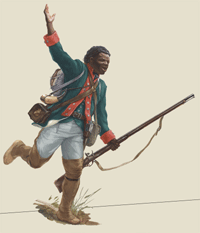Praising the Past
The War of 1812: A Black Bicentennial Perspective
By C.R. Gibbs
Blacks with the Americans
At the beginning of the war, there were 1.3 million persons of African descent in the United States, representing 19 percent of the total population. Eighty seven percent of the Black population was enslaved. Thirteen percent was free. The two and a half year conflict between England and the United States began in 1812. No matter how little known or remembered today, the war was a transforming struggle for many Blacks.
Thousands of men, women and children left slavery's grief in the wake of the British ships they sailed away on to an often arduous, but free future in ports as distant as Trinidad, Nova Scotia and Sierra Leone. Men of African descent in opposing armies warily eyed each other over their gunfights in several of the war's major battles, including Bladensburg and New Orleans. And throughout America, at all times, Black people sought to exploit the opportunities and inconsistencies of the war for one paramount objective: freedom.
History books tell us that the war had three major causes: the seizure of American vessels trading with France (with whom England was fighting), England's arming of Native Americans who raided American frontier settlements and England's forcible taking of thousands of sailors in an act known as "impressment." (The Impress Service was formed to force sailors to serve on naval vessels -- there was no concept of joining the navy as a fixed career path for non-officers at the time.)
In 1807, in one of the war's most notorious preludes, at least one of the four men British sailors seized by force from the American frigate "Chesapeake," was David Martin, a free Black man from Massachusetts. Some scholars believe that two other impressed crewmen, Strachan and Ware, were also Black. The British claimed they were members of the British Royal Navy.
Despite both a 1792 militia act and a Federal ban on Black military service, large numbers of African Americans enlisted in the American Navy seeking opportunity and relishing the freedom of the seas. They comprised over 15 percent of all American naval forces and participated in many significant naval battles.
In 1814, at the Battle of Lake Erie, considered the war's most important naval engagement, Blacks made up nearly a quarter of the complement of the American squadron. Some Blacks were even able to enlist in the regular United States Army, particularly in the 26th Regiment. In 1814, New York State recruited 2,000 free and enslaved Blacks, promising the enslaved their freedom at the end of the war.
In cities and on plantations, many American slave-owners feared their enslaved would rebel when they heard about the war. In Georgia and East Florida, fugitive enslaved Blacks joined Native Americans and conducted guerilla warfare. Patrols increased as did reports of enslaved conspiracies and news of actual or attempted revolts from Mississippi to Maryland. When the mayor of Washington, D.C. learned that British troops were about to invade the city, "he even begged colored men to join the citizens' corps of workers" to help protect the city, wrote one historian. After the British redcoats had left, he expressed his gratitude for their "zeal,” "order" and “propriety."
Blacks with the British
 When the British fleet arrived in the Chesapeake Bay in March 1813, between 3,000 to 5,000 enslaved individuals and families ultimately made their way to these vessels. At the end of the war, nearly 1,500 runaways were with the Royal Navy when it evacuated Cumberland Island, Georgia. At Fort Albion on Tangier Island in the Chesapeake Bay, the British trained African Americans who served in the Colonial Marines disrupted commerce and freed enslaved Africans along the Northern Neck of Virginia and the Eastern Shore of Maryland. British forces also made excellent use of African Americans, African Canadians, and West Indian troops. When the British fleet arrived in the Chesapeake Bay in March 1813, between 3,000 to 5,000 enslaved individuals and families ultimately made their way to these vessels. At the end of the war, nearly 1,500 runaways were with the Royal Navy when it evacuated Cumberland Island, Georgia. At Fort Albion on Tangier Island in the Chesapeake Bay, the British trained African Americans who served in the Colonial Marines disrupted commerce and freed enslaved Africans along the Northern Neck of Virginia and the Eastern Shore of Maryland. British forces also made excellent use of African Americans, African Canadians, and West Indian troops.
Photo: British loyalist and Senegambian-Canadian
Richard Pierpoint. Artwork by Malcolm Jones,
courtesy Canadian War Museum
Useful Links
War of 1812 Bicentennial International Events
Maryland Star Spangled 200
Virginia Bicentennial of the American War of 1812
|